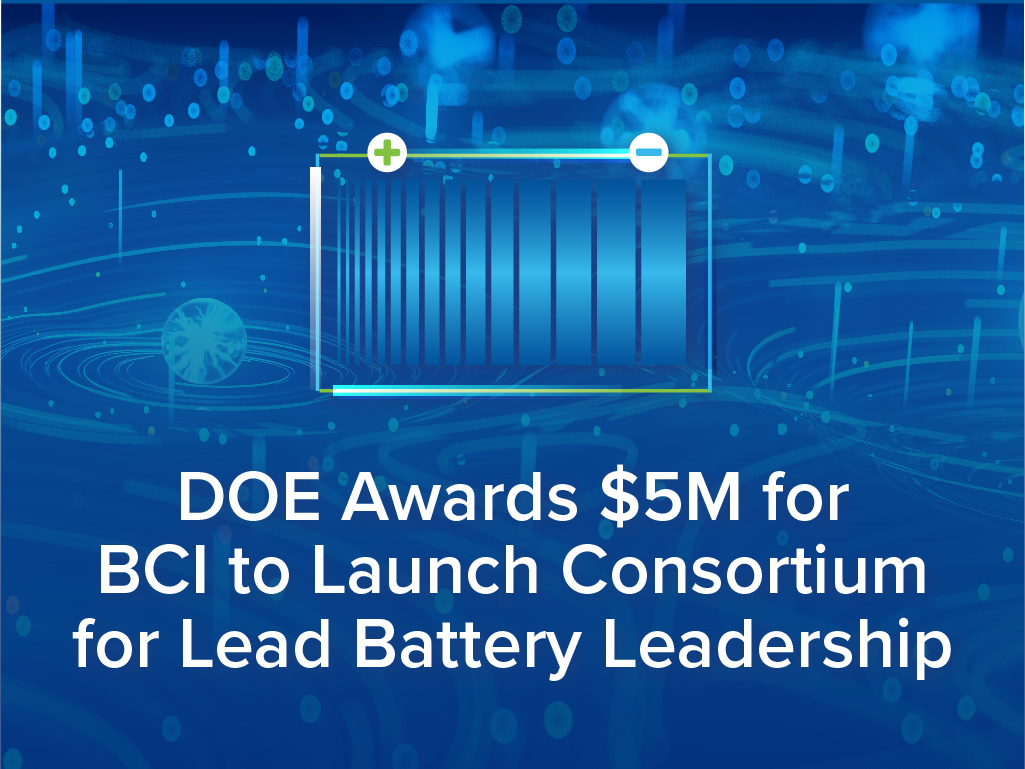
DOE awards $5 million for BCI to support long-duration energy storage research in collaboration with national labs
WASHINGTON, D.C. — Battery Council International (BCI) has been awarded $5 million by the U.S. Department of Energy (DOE) so that it can establish the Consortium for Lead Battery Leadership in Long Duration Energy Storage (LDES). The just-announced award is part of DOE’s Storage Innovations 2030: Technology Liftoff funding opportunity.
BCI will work with the Consortium for Battery Innovation (CBI) to manage the program and technical direction.
The soon-to-launch Consortium for Lead Battery Leadership in LDES will bring together Battery Council International, CBI, eight U.S. lead battery manufacturers, and three national laboratories to conduct pre-competitive research aimed at improving lead battery performance. BCI’s goal for the Consortium is to develop lead batteries capable of 10+ hours of storage with a pathway to $0.05/kWh Levelized Cost of Storage by 2030.
“We are excited and grateful for this opportunity to partner with the Department of Energy and our national labs to accelerate innovation in lead battery technology for long duration energy storage,” said Roger Miksad, President and Executive Director of BCI. “Lead batteries have a critical role to play in enabling a reliable, resilient and affordable clean energy future. Through the power of collaboration, this consortium will help unleash the full potential of lead batteries to support the nation’s storage needs.”
Matt Raiford, Consortium for Battery Innovation Technical Director, said: “This project will help us demonstrate the significant technical capabilities of advanced lead batteries to support next generation energy storage facilities.”
BCI member companies participating in the consortium include Advanced Battery Concepts, C&D/Trojan, Clarios, Crown Battery, East Penn Manufacturing, EnerSys, Gridtential, and Stryten Energy. The collaborating national laboratories are Argonne National Laboratory, Oak Ridge National Laboratory, and Pacific Northwest National Laboratory.
The three-year program will combine advanced techno-economic analysis with fundamental materials science research. Researchers will construct new use-case models for Long Duration Energy Storage and study the behavior of lead sulfate crystals, which impact battery efficiency. Advanced computer modeling of structurally similar barium sulfate crystals conducted at Oak Ridge National Laboratory will inform the development of more efficient lead batteries.
Lead batteries have unique advantages including an established domestic supply chain, use across all economic segments and a recycling rate of nearly 100%. Through collaboration and innovation, the Consortium for Lead Battery Leadership in LDES aims to realize the full potential of this essential technology by achieving performance improvements.
About Battery Council International
Battery Council International (BCI) is the leading trade association representing the global battery industry and is the premier authority on energy storage solutions. Celebrating its 100th anniversary in 2024, BCI advocates and educates on behalf of battery manufacturers and recyclers, marketers and retailers, suppliers of raw materials and equipment, and battery distributors. With a unified voice, BCI conveys an industry-wide commitment to sustainability, safety and science. The organization continues to unite members within the energy storage industry to successfully communicate and protect through education, science and advocacy efforts the most successful circular economy on the planet. With 99% of used lead batteries collected and recycled in the U.S. and the typical new lead battery containing 80% or more of recycled materials, BCI supports the path toward similar sustainability goals for all other battery chemistries. For more information, visit www.batterycouncil.org.
For additional information, contact media@batterycouncil.org.


